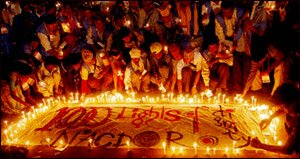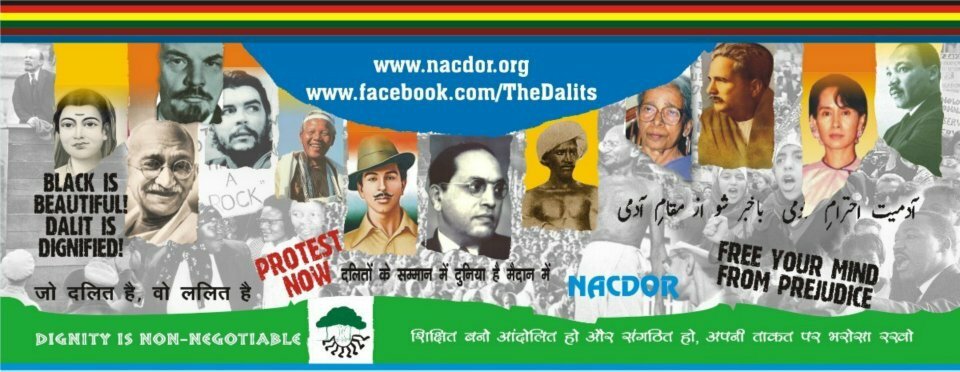Overview
National Confederation of Dalit Organisations (NACDOR) is a national platform of Dalit Organisations in India. NACDOR is committed to an inclusive, progressive, secular, democratic and non-sectarian society. While firmly believing in equality, social justice and equal dignity for all, NACDOR promotes democracy, human rights, sustainable development and peace and reconciliation with the perspective of the socially excluded Dalits.
Founded by the Centre for Alternative Dalit Media (CADAM) in 2001, NACDOR is a membership-based platform. Its membership is open to all organisations working for the Scheduled Castes, Scheduled Tribes, Minorities and other socially excluded sections of Indian society. It has evolved organically through a democratic process of creative engagement of the Dalit community with secular, democratic and progressive forces, civil society and governance structures at various levels in Indian Society.
Led by Dalits, NACDOR works towards the advancement of socially excluded sections through innovative programmes, enabling strategies, and community based interventions that tap on the synergies of various stakeholders working towards the goals of social, economic, cultural and political empowerment of Dalits and other.
While firmly believing that the Scheduled Castes and the Scheduled Tribes are the most vulnerable, excluded and disadvantaged in India, NACDOR emphasizes that the emancipatory efforts of these historically marginalized sections can only be successful if they lead the movement for the betterment of all the poor, excluded and marginalized with their stake and participation. Therefore, NACDOR works to complement the struggles of women, the working class, the poor, deprived and discriminated on any grounds.
NACDOR has been successful in impacting Dalit discourse within and outside the country. Among its successes include the founding of the World Dignity Forum and spearheading 5th December as World Dignity Day – International Day of the Socially Excluded. NACDOR is now recognised as a representative of Dalits in India’s Civil Society Movement.
Innovative in its work and strategy, NACDOR institutionalized policy advocacy and understanding on ‘Budget and Development Planning’ for Dalits and founded platforms of Dalits such as the Rashtriya Dalit Mahasabha, the Rashtriya Dalit Mahila Andolan and the Akhil Bhartiya MGNREGA Mazdoor Union.
NACDOR has enlarged the Dalit agenda, engaged with Government on Development Planning and the Annual National Budget, and has influenced private sector organisations such as the Confederation of Indian Industry to implement Affirmative Action policies and institutionalize Dalit Civil Society through various enabling mechanisms, including raising resources, building capacities and providing critical leadership to build perspective.
Headquartered in New Delhi, NACDOR is run by a team of professionals led by its Chief Executive Officer.
Vision
 NACDOR’s vision is to build a Prabuddha Samaj (Enlightened Society) based on the principles of dignity, justice, equality, freedom and fraternity. We strive for ecological balance and active peace and work towards equal access and rights over resources and services, without any prejudice, discrimination or exclusion on any basis, including caste, class, race, gender, age, religion, abilities, regions, language or property. We strive for a society where human rights and equal dignity of all are respected and there is no place for exploitation or oppression.
NACDOR’s vision is to build a Prabuddha Samaj (Enlightened Society) based on the principles of dignity, justice, equality, freedom and fraternity. We strive for ecological balance and active peace and work towards equal access and rights over resources and services, without any prejudice, discrimination or exclusion on any basis, including caste, class, race, gender, age, religion, abilities, regions, language or property. We strive for a society where human rights and equal dignity of all are respected and there is no place for exploitation or oppression.
Mission
NACDOR will strive to build a strong emancipatory movement of Dalits and other disadvantaged sections in India, which can re-structure the existing social-economic-political-cultural structures in line with the aspiration and dreams of Dalits and other disadvantaged communities.
NACDOR’s work will primarily focus on the Scheduled Castes (SCs), Scheduled Tribes (STs), Socially and Educationally Backward Classes (SEBCs), Minorities and other socially excluded sections of Indian Society, which have been largely identified as disadvantaged groups in India’s Constitution.

